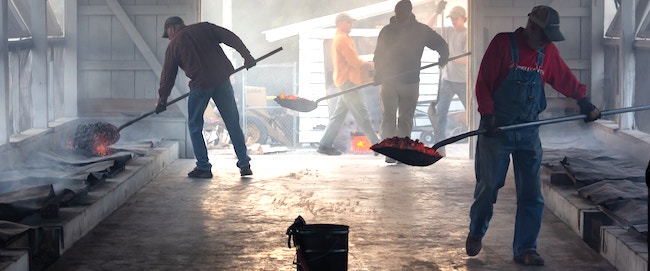
These divrei Torah were adapted from the hashkafa portion of Rabbi Yissocher Frand’s Commuter Chavrusah Tapes on the weekly portion: Tape # 231, Making a Siyum. Good Shabbos!
We Toil and Receive Reward — For the Toil!
Parshas Pikudei concludes the construction of the Mishkan. After the construction of all the individual components of the Mishkan, the parts were brought to Moshe. Rashi quotes the Medrash Tanchuma that explains that the Mishkan was brought to Moshe because everyone else was unable assemble it. The Mishkan was simply too heavy for anyone to lift. Since Moshe had not been personally involved in any part of the construction of the Mishkan, HaShem [G-d] reserved the privilege of final assembly for him.
When HaShem told Moshe to assemble the Mishkan, Moshe protested that it was too heavy for him to lift, as well. HaShem told Moshe to make the effort. “Make it look like you are trying to erect it.” Moshe made the effort, and miraculously, it assembled itself. Since Moshe made the effort, he received the credit for having put it up.
Rav Meir Rubman explains that we can learn a very important insight regarding spirituality from this Medrash. The Medrash teaches us that regardless of the difficulty of the task, we must make the effort. In other areas of endeavor, a person only gets credit for producing. However, when it comes to Judaism, HaShem is not necessarily interested in results; He is interested in the effort.
The concept that a person receives an “A” for effort is usually a backhanded compliment. In actuality, you received a “D” – a near failing grade, but at least you received an “A” for effort. That is the way it is in other areas of life. However, by Mitzvos, all Hashem asks from us is that we make the effort. Whether the task is actually accomplished or not is often out of our control and up to Hashem.
At the conclusion of a Mesechta [tractate of the Talmud], we say the prayer “We toil and they toil. We toil and receive reward and they toil and do not receive reward.” What does it mean, “they toil and do not receive reward”? This does not seem to be a true statement. People do not work without receiving payment!
The answer is that when we work (at religious tasks), we receive pay for the effort, regardless of whether or not we produce. However, ‘they’ only receive pay for the bottom line. In all other areas of endeavor, toil that does not produce results does not receive reward.
Not long ago (1992), I was in Atlanta for a Torah retreat. Atlanta is an amazing community. Thirty years ago, they did not have a minyan [quorum] of Sabbath observers. Today, over 300 people come to shul on Shabbos — all of them are in some stage of having intensified, and intensifying, their observance of mitzvos.
I asked Rabbi Emanuel Feldman (Rabbi Emeritus of Congregation Beth Jacob in Atlanta), “What is the key to your success?” Rabbi Feldman told me that the key is to try to plant seeds. That is all a Rabbi can do. He can try to nurture and water the seeds, but really all he can do is try. He never knows for sure whether or not his efforts will succeed.
For example, one individual who recently returned to intensive Jewish involvement and observance told Rabbi Feldman that he made his decision because of a Yom Kippur sermon that Rabbi Feldman delivered fifteen years earlier. A comment in that sermon had struck home. He did not act upon it then, but fifteen years later, he decided to become religious.
Success is not the correct measure. Kiruv Rechokim is about effort. Whether or not the Mishkan is actually erected is HaShem’s worry. We toil and we receive reward – for the effort.
Transcribed by David Twersky; Jerusalem [email protected]
Technical Assistance by Dovid Hoffman; Baltimore, MD [email protected]
This week’s write-up is adapted from the hashkafa portion of Rabbi Yissochar Frand’s Commuter Chavrusah Series on the weekly Torah portion. A listing of the halachic portions for Parshas Vayakeil/Pikudei is provided below:
- # 047 Pikuach Nefesh: To Save a Life
- # 090 The Melacha of Carrying
- # 138 The Melacha of Tying Knots on Shabbos
- # 185 The Melacha of Writing
- # 231 Making a Siyum
- # 275 Electricity in Halacha
- # 321 Leap Year and the Second Adar
- # 365 The Melacha of Tearing
- # 409 The Melacha of Melabain (Laundering)
- # 453 Wearing A Watch on Shabbos
- # 497 The Tefillah of B’rich Sh’mei
- # 541 Learning Kabbalah
- # 585 The Melacha of Trapping
- # 629 Sitting in Judgement on Shabbos
- # 672 The Mishebeirach in Halacha
- # 673 Putting A Sefer Torah in the Aron
- # 717 One Hundred Brachos A Day
- # 761 Killing Two Birds with One Stone
- # 805 Baruch Sh’omar, Ashrei and Yishtabach
- # 849 Saying L’shem Yichud – A Good Idea?
- # 893 The Unique Parshas Sh’kolim
- # 937 Magnetic Forces
- # 980 Siyum M’sechta: For The Past Or For The Future?
- #1024 Turning That Old Dress Into A Cover for a Sefer Torah?
- #1068 “This (Aron Kodesh/Ner Tamid/Window) Is Donated By”…A Good Idea
- #1111 Paying the Baal Koreh/Chazan/Babysitter for Shabbos
- #1154 Does The Husband’s Early Kabolas Shabbos Affect His Wife?
- #1197 Hachana Issues: Loading Dishwasher on Shabbos; Defrosting For Yom.Tov Sheni
- #1241 The Case of the Mishloach Manos That Was Delivered to the Wrong Person
- #1285 “It’s A Siman Min HaShamayim”: Is There Such A Thing?
A complete catalogue can be ordered from the Yad Yechiel Institute, PO Box 511, Owings Mills MD 21117-0511. Call (410) 358-0416 or e-mail [email protected] or visit http://www.yadyechiel.org/ for further information.


